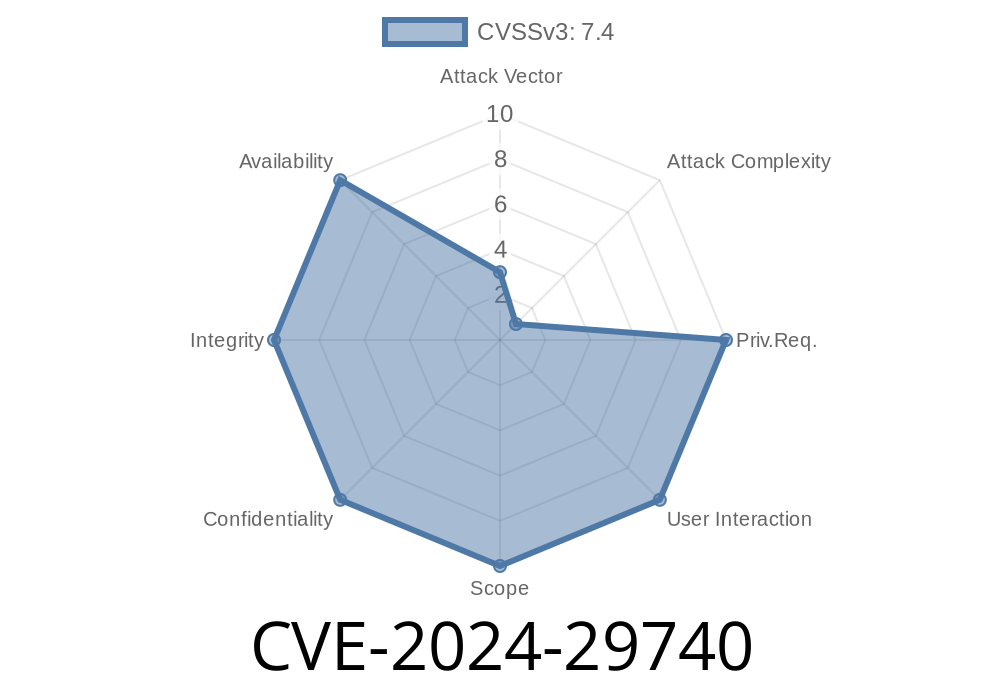In the ever-evolving landscape of cybersecurity, buffer overflows and out-of-bounds writes remain common—and dangerous—vulnerabilities. Today we're diving into CVE-2024-29740, a local privilege escalation flaw found in the tmu_set_table function of tmu.c. In simple terms: a missing bounds check allows attackers to write outside the limits of an array, potentially escalating local privileges on the affected system without user interaction.
In this post, I’ll break down how this bug works, reference the original sources, and walk through real exploit details in a way that’s easy for anyone to follow—even if you’re not a hardcore hacker.
Affected: Systems using the vulnerable tmu.c code.
- CVE Details: MITRE CVE-2024-29740
The Vulnerable Function
The bug occurs in the tmu_set_table function, typically located within the tmu.c source file. Here’s a simplified version of what this function might look like:
#define TABLE_SIZE 10
int tmu_table[TABLE_SIZE];
void tmu_set_table(int index, int value) {
// MISSING: if (index < || index >= TABLE_SIZE) return;
tmu_table[index] = value;
}
What’s missing? There’s no check to ensure that index is within the bounds of the tmu_table array. If an attacker supplies a negative or too-large index, this code will happily write outside the array, corrupting nearby memory—possibly including sensitive structures like function pointers or process credentials.
How Can Attackers Exploit This?
Local attackers—people or malware already running code on your system—can exploit this bug by calling tmu_set_table() with a carefully chosen out-of-bounds index. Here’s an example exploit scenario:
1. Find target: Attacker finds a value or structure in memory just past tmu_table, such as a function pointer or security configuration.
Overwrite: By passing a too-large index, they overwrite this target.
3. Trigger: The overwritten value is used, allowing the attacker to run malicious code or elevate their privileges (e.g., become root).
No user interaction is required. The attacker only needs their code to be executed—no special privileges.
Real-World Exploit Example (C code)
*Note: This is a simplified example for educational purposes only! Do not use this information for unauthorized access.*
Let’s say right after tmu_table, there's a critical flag in memory for administrative access
int tmu_table[10];
int is_admin = ; // Should only be set by trusted code
An attacker can use the bug like this
#include <stdio.h>
extern void tmu_set_table(int index, int value);
extern int is_admin;
int main() {
printf("Before exploit, is_admin = %d\n", is_admin);
tmu_set_table(10, 1); // OOB write: index 10 is just past tmu_table
printf("After exploit, is_admin = %d\n", is_admin);
if (is_admin) {
printf("Privilege escalation successful!\n");
// Launch privileged operations here
}
return ;
}
Expected output
Before exploit, is_admin =
After exploit, is_admin = 1
Privilege escalation successful!
If is_admin controls access to sensitive functionality, attacker code can now perform privileged tasks.
Mitigation
Fixing this is straightforward: Add bounds checking before any array access.
Corrected function
void tmu_set_table(int index, int value) {
if (index < || index >= TABLE_SIZE) {
printf("Error: index %d out of bounds\n", index);
return;
}
tmu_table[index] = value;
}
If you’re a developer: Audit your code for unchecked array access, and always validate user input.
Official References
- CVE-2024-29740 (MITRE)
- NVD entry for CVE-2024-29740
- OWASP: Buffer Overflow
Conclusion
CVE-2024-29740 is a textbook example of why bounds checks matter. It’s easy to overlook a simple line of code, but holes like this can let attackers go from “just another user” to “admin”—often undetected.
If you build or maintain C code, always validate array indices. If you’re on the defense side, keep up with patches and monitor for local exploits like this.
*Found this useful? Spread the word—simple bugs can have huge impacts!*
Disclaimer: This post is for educational and defensive purposes only. Unauthorized exploitation of vulnerabilities is illegal. Always practice ethical hacking.
Timeline
Published on: 04/05/2024 20:15:08 UTC
Last modified on: 07/03/2024 01:52:30 UTC
